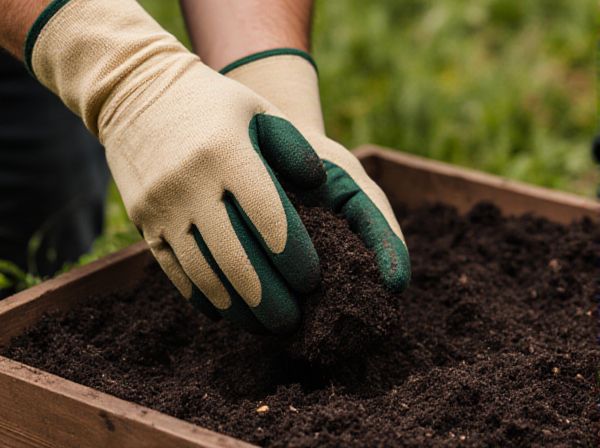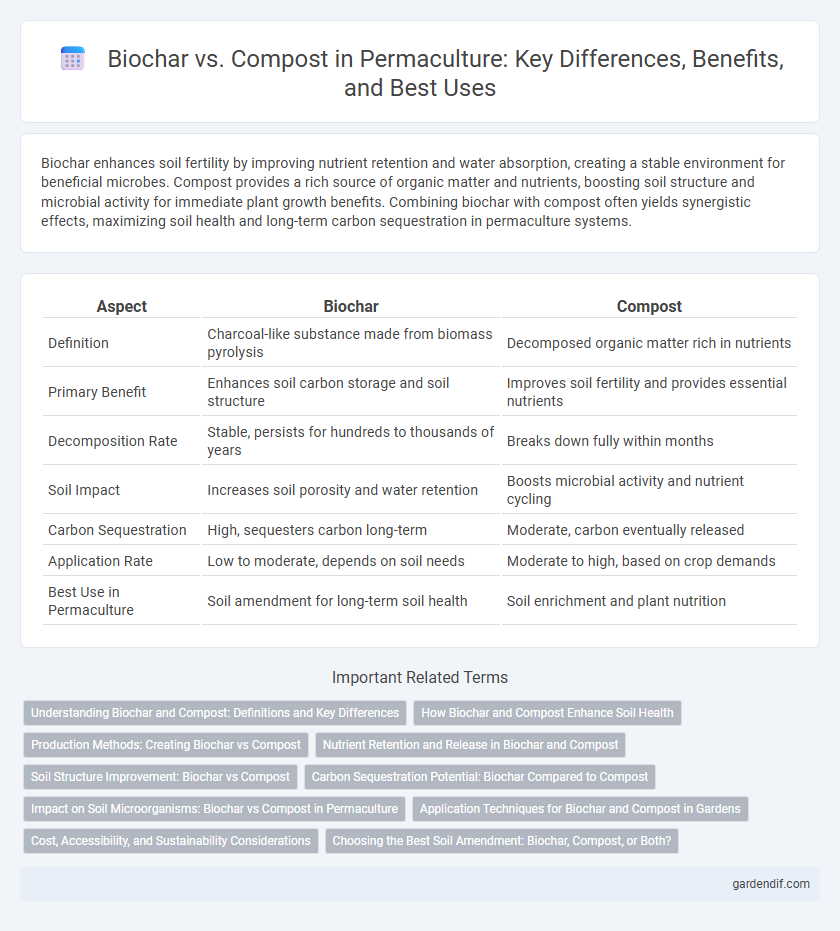
Biochar vs compost Illustration
Biochar enhances soil fertility by improving nutrient retention and water absorption, creating a stable environment for beneficial microbes. Compost provides a rich source of organic matter and nutrients, boosting soil structure and microbial activity for immediate plant growth benefits. Combining biochar with compost often yields synergistic effects, maximizing soil health and long-term carbon sequestration in permaculture systems.
Table of Comparison
| Aspect | Biochar | Compost |
|---|---|---|
| Definition | Charcoal-like substance made from biomass pyrolysis | Decomposed organic matter rich in nutrients |
| Primary Benefit | Enhances soil carbon storage and soil structure | Improves soil fertility and provides essential nutrients |
| Decomposition Rate | Stable, persists for hundreds to thousands of years | Breaks down fully within months |
| Soil Impact | Increases soil porosity and water retention | Boosts microbial activity and nutrient cycling |
| Carbon Sequestration | High, sequesters carbon long-term | Moderate, carbon eventually released |
| Application Rate | Low to moderate, depends on soil needs | Moderate to high, based on crop demands |
| Best Use in Permaculture | Soil amendment for long-term soil health | Soil enrichment and plant nutrition |
Understanding Biochar and Compost: Definitions and Key Differences
Biochar is a stable form of charcoal produced through pyrolysis that enhances soil fertility by improving nutrient retention and water holding capacity. Compost consists of decomposed organic matter rich in nutrients, promoting microbial activity and providing immediate nutrient availability to plants. Unlike compost, biochar primarily acts as a soil conditioner with long-term benefits, while compost delivers rapid nutrient release essential for plant growth.
How Biochar and Compost Enhance Soil Health
Biochar improves soil health by increasing nutrient retention, enhancing microbial activity, and improving soil structure, which leads to better water retention and aeration. Compost supplies essential nutrients and organic matter that promote microbial diversity and soil fertility, accelerating plant growth and nutrient cycling. Together, biochar and compost create synergistic effects that boost soil resilience, fertility, and long-term productivity in permaculture systems.
Production Methods: Creating Biochar vs Compost
Biochar is produced through pyrolysis, a controlled process of heating organic material in the absence of oxygen, which results in a stable, carbon-rich substance ideal for soil amendment. Composting involves aerobic decomposition, where microorganisms break down organic waste into nutrient-rich humus through a natural, oxygen-reliant process. Biochar production emphasizes thermal transformation to create a long-lasting soil enhancer, while composting focuses on biological degradation to recycle nutrients efficiently.
Nutrient Retention and Release in Biochar and Compost
Biochar exhibits superior nutrient retention due to its porous structure, which adsorbs and holds essential minerals like nitrogen, phosphorus, and potassium, reducing leaching losses in soil. Compost provides a rapid nutrient release through microbial decomposition, enriching soil with organic matter and supporting immediate plant uptake. Combining biochar with compost can optimize nutrient availability by merging biochar's long-term retention with compost's quick nutrient supply, enhancing soil fertility in permaculture systems.
Soil Structure Improvement: Biochar vs Compost
Biochar enhances soil structure by increasing porosity, water retention, and aeration, which promotes beneficial microbial activity and root growth. Compost improves soil aggregation and nutrient availability while enhancing microbial diversity, leading to better soil fertility and structure. Combining biochar with compost can synergistically improve soil physical properties and nutrient cycling for sustainable permaculture systems.
Carbon Sequestration Potential: Biochar Compared to Compost
Biochar exhibits a significantly higher carbon sequestration potential than compost due to its stable, carbon-rich composition that can persist in soil for hundreds to thousands of years. Compost, while beneficial for soil health and nutrient cycling, typically releases carbon back into the atmosphere within a few years through microbial decomposition. Incorporating biochar into permaculture systems enhances long-term carbon storage, improving soil fertility while mitigating climate change by locking carbon away more effectively than traditional composting methods.
Impact on Soil Microorganisms: Biochar vs Compost in Permaculture
Biochar enhances soil microorganisms by providing a stable habitat that increases microbial diversity and activity, promoting nutrient retention and improving soil structure. Compost supplies a rich source of organic matter and nutrients, fueling microbial growth and accelerating decomposition processes crucial for soil fertility. In permaculture, combining biochar and compost synergistically optimizes microbial ecosystems, enhancing soil resilience and plant health.
Application Techniques for Biochar and Compost in Gardens
Biochar enhances soil structure and water retention when applied by mixing it with compost or soil before planting, often requiring a "charging" process to inoculate it with nutrients. Compost application typically involves spreading a uniform layer of well-decomposed organic matter on garden beds, improving microbial activity and nutrient availability. Combining biochar with compost maximizes benefits by stabilizing nutrients and promoting healthier plant growth in permaculture gardens.
Cost, Accessibility, and Sustainability Considerations
Biochar offers long-term soil enhancement with high carbon sequestration potential, but its production involves higher upfront costs and specialized equipment, limiting accessibility for small-scale permaculture practitioners. Compost is more affordable and easily produced from organic waste on-site, providing immediate nutrient benefits and promoting circular waste management. Sustainability-wise, biochar's stability contributes to prolonged soil health improvements, while compost supports microbial activity and rapid nutrient cycling, making both essential but complementary in permaculture systems.
Choosing the Best Soil Amendment: Biochar, Compost, or Both?
Biochar enhances soil structure and water retention by increasing porosity and adsorbing nutrients, making it valuable for long-term soil health. Compost supplies essential nutrients and beneficial microorganisms that promote immediate plant growth and improve soil fertility. Combining biochar with compost creates a synergistic effect, optimizing nutrient availability, microbial activity, and soil carbon sequestration for sustainable permaculture practices.
Biochar vs compost Infographic

 gardendif.com
gardendif.com